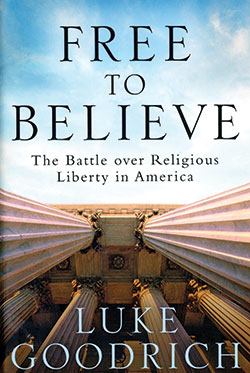Free to Believe explores religious liberty from legal and biblical perspectives
By Sean Gallagher
 Luke Goodrich is one of the country’s foremost experts on religious freedom.
Luke Goodrich is one of the country’s foremost experts on religious freedom.
In his work as a lead attorney at the Washington-based Becket Fund for Religious Liberty, he’s been involved in some of the most high-profile religious freedom cases to come before the U.S. Supreme Court in recent years, representing the Little Sisters of the Poor and the Green family, which owns the Hobby Lobby chain of arts and crafts stores.
The religious liberty of his clients was upheld in both of those landmark cases and in others that Goodrich has argued before the high court.
So, one might think that Goodrich would have a singular focus on winning his clients’ cases and defeating their opponents.
But he doesn’t. In Free to Believe: The Battle over Religious Liberty in America (Multnomah, 2019), Goodrich instead advises his readers to “let go of winning.”
Turning their attention to Scripture, he writes that “we’re called not to win, but to be like Jesus; not to fear suffering, but to fear God; not to be surprised at hostility, but to expect it; not to complain when we lose, but to rejoice; not to lash out at our opponents, but to love them. We’re called not to avoid losing at all costs, but to glorify God at all costs.”
Although Goodrich presents in his book a reason-based argument for religious liberty that could appeal to people of all faiths or none at all, it is clear that his primary audience is Christians who are already convinced of the validity and importance of religious freedom.
At the same time, as one would expect of an attorney involved in important religious liberty cases, Goodrich shows a clear understanding of the arguments of those who advocate for a narrow understanding of the conscience rights of religious individuals and organizations.
When explaining their views, Goodrich does so in a matter-of-fact manner, showing no ill will toward those who oppose religious liberty. And he gives a sober analysis of where legal challenges to religious freedom may go in the months and years ahead, and what churches, religious individuals and organizations can do to put themselves in the best position possible to be victorious in court.
While these cases are often complex and involve detailed legal arguments on both sides, Goodrich shows throughout his book a deft ability to express the often-complex legal realities of religious liberty litigation in ways that a general audience will understand without oversimplifying them.
This skill in communicating legal concepts and how they apply to everyday life might be expected of a top-flight lawyer like Goodrich.
What might more surprise readers is Goodrich’s thoughtful approach to exploring how religious liberty is treated in sacred Scripture.
He shows in examining passages from both the Old and New Testaments that religious liberty is at the heart of both the Jewish and Christian understanding of the human person.
Goodrich goes on to observe how figures throughout the Bible—from prophets like Jeremiah and Daniel to the Apostles and first members of the Church—took different approaches in dealing with challenges to their religious liberty, depending on the particular circumstances of the situation.
Some found ways of accommodation with governmental authorities while others accepted suffering for their fidelity to the Lord. The Apostles, in fact, saw such tribulations as a badge of honor, “rejoicing that they had been found worthy to suffer dishonor for the sake of the name” (Acts 5:41).
In the end, Goodrich looks to both the recent history of religious liberty litigation in the U.S. and the wisdom of the Scriptures in giving advice for Christians in America regarding how to deal with challenges to their conscience rights in the future.
He calls on Christians to be faithful to the teachings of their faith and to communicate clearly how those teachings are relevant to their mission and employment practices. At the same time, they should always seek peace with those who disagree with them if such peace is possible.
All of this and other recommendations Goodrich makes in the end, he says, are simply calls for Christians to be more Christ-like. That, by no means, will guarantee courtroom victories, for Christ himself suffered a terrible legal injustice at the hands of Pontius Pilate.
In either victory or defeat, however, Christians seeking to be faithful to God and defending religious liberty when necessary will provide to the broader society a witness to the Gospel and the “glorious freedom of the children of God” that it proclaims (Rom 8:21). †
